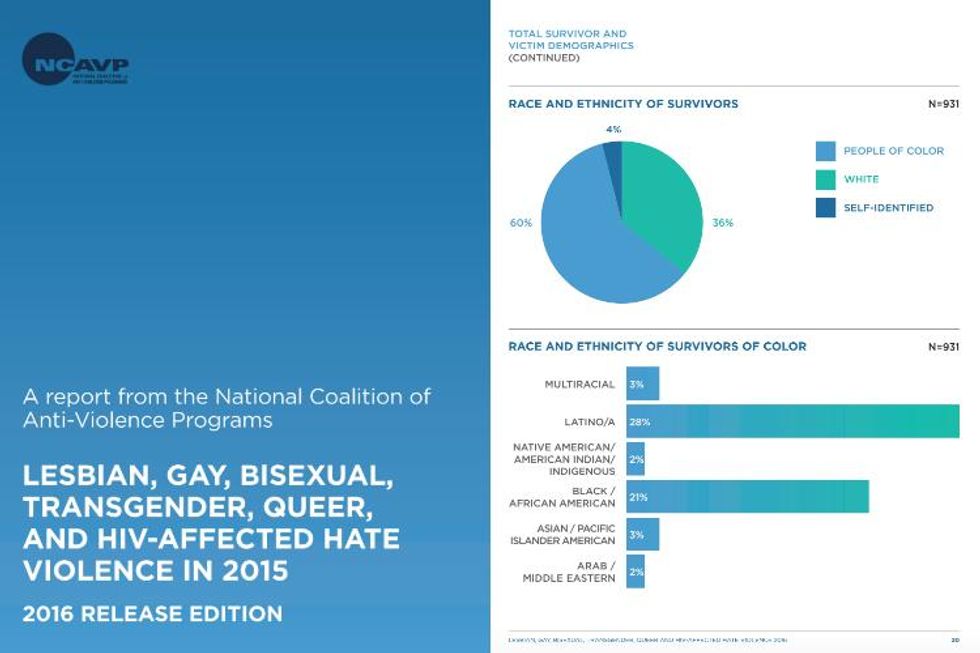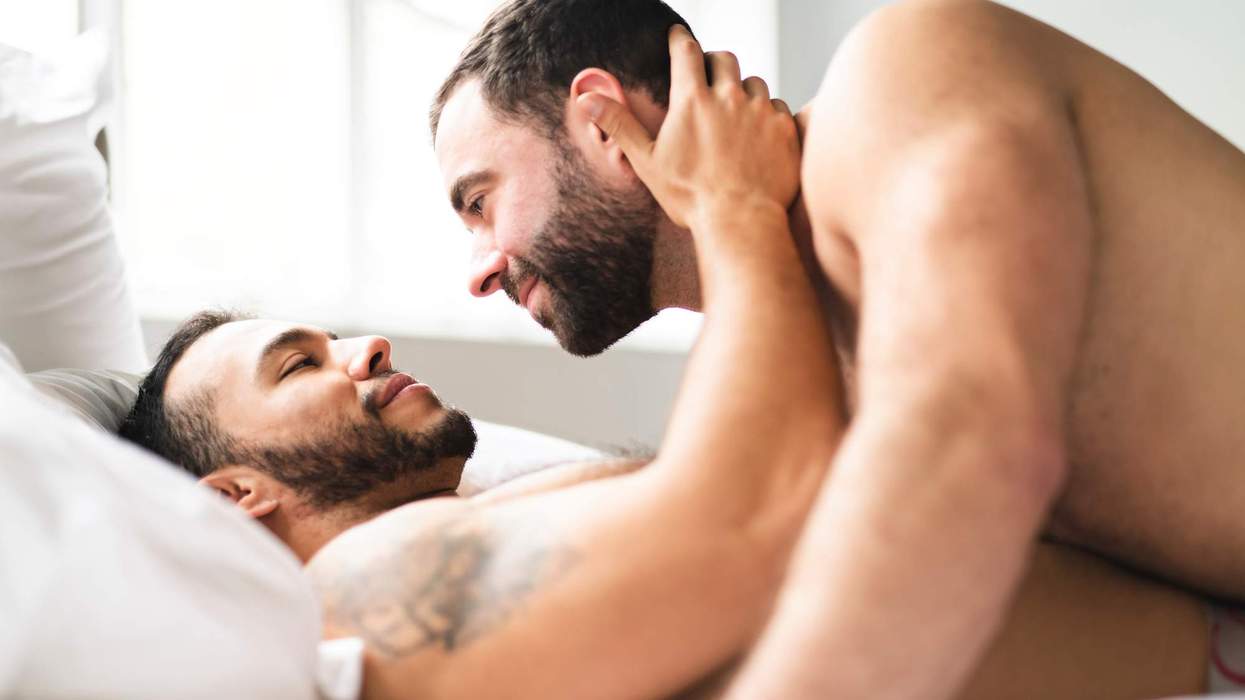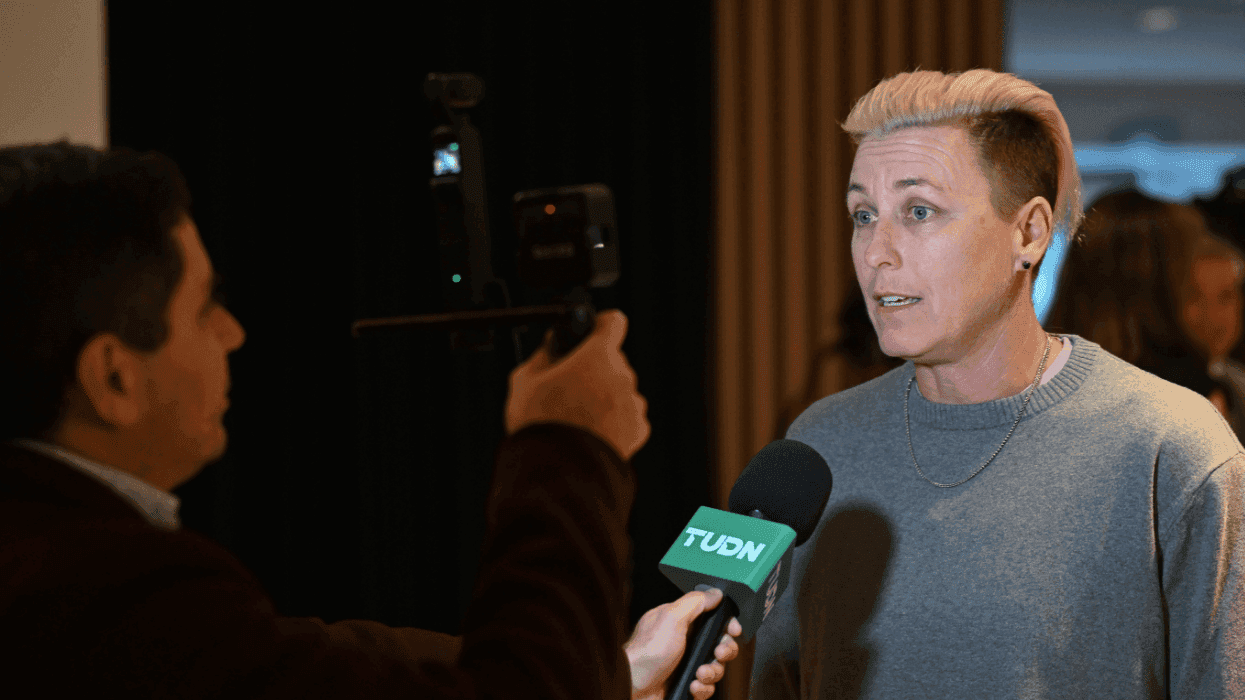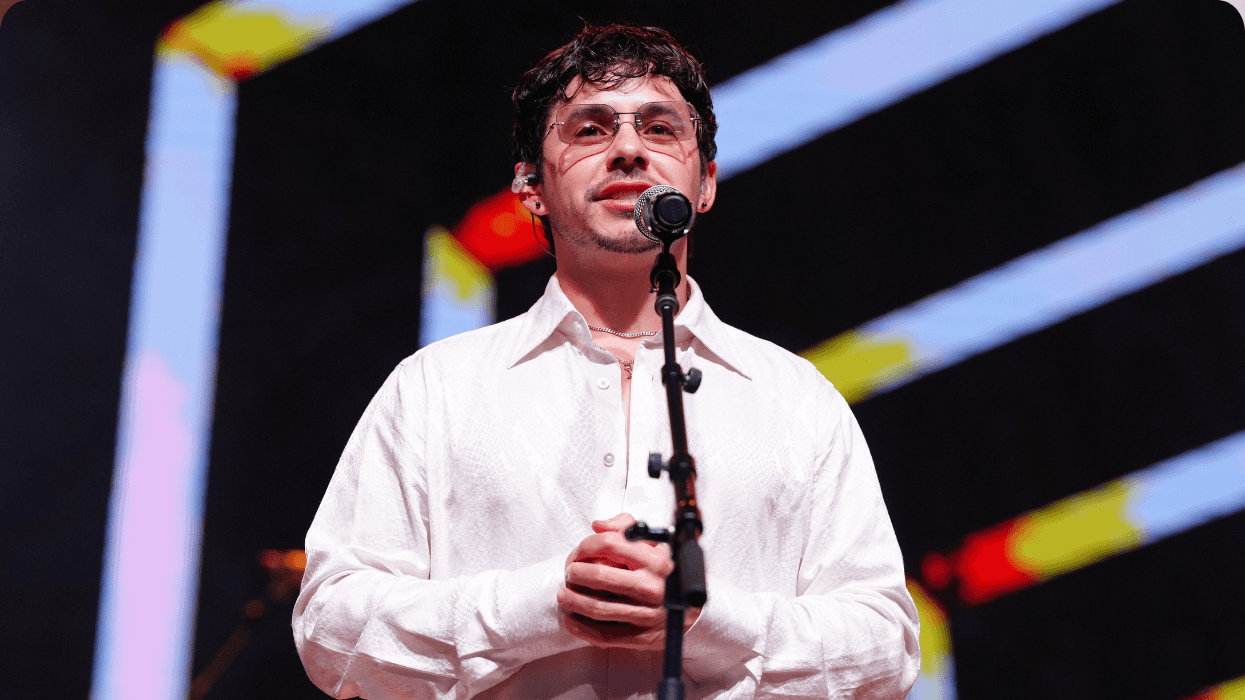Names of victims from top left to right: Jean Carlos Mendez Perez, 35, Mercedez Marisol Flores, 26, Gilberto Ramon Silva Menendez, 25, Juan Ramon Guerrero, 22, Anthony Luis Laureano Disla, 25, Xavier Emmanuel Serrano Rosado, 35.
Spanish translation by/ traducido al Espanol por Rodrigo Torrano
[espanol abajo]
As the news of the massacre at Pulse nightclub has unfolded, the dominant narrative has been debating whether this attack was an act of "domestic terrorism" or an intentional mass murder of LGBTQ people.
As families and loved ones grieve and prepare to bury bodies, we must remember that the Pulse shooting was an act of hate violence targeting Latinx people, a gender-inclusive term to acknowledge people of Latin American heritage or descent.
This was not an attack on the entire LGBTQ community.
Across the country, LGBTQ people of color know that we cannot expect every gay club to be a safe place. We must continue to create one night per month just for us. That night at Pulse was a night for our community.
For many of us, when we read the initial news reports that this wasn't just a gay club that was attacked, but specifically a gay club that was hosting a Latino night, we were gripped with the reality that LGBTQ people of color would be the majority of victims. We didn't need to await the list of names to know the devastation.
I spoke to a variety of LGBTQ Latinx-identified community organizers, advocates, and nightlife promoters to discuss the anticipated, residual trauma that will face our communities after the Pulse massacre.
Related | Queer Latinx Reactions in the Wake of the Orlando Tragedy
Milani Ninja, a performer in Chicago, reflected with me over the phone hours after the attack. "With the crisis going on right now in Puerto Rico, largely that the U.S. is responsible for, with no jobs, resources, and limited medical access, it's really bad that people had to move to other cities like Orlando," she said. "So, what if this crisis in Puerto Rico wasn't going on, maybe these people at Pulse would still be alive?"
In response to the hopelessness of Orlando, residual trauma and posttraumatic stress will increase in LGBTQ Latinx communities across the country. We may lose more of our loved ones to self-harm and suicide as the dominant narrative reveals that being LGBTQ is essentially unsafe.
This is an example of systematic violence facing LGBTQ black and brown people--and we've seen this before.
With the petition of Leelah's Law, a suggested law which would federally ban conversion therapy after the suicide of Leelah Alcorn, a 16-year-old transgender girl in 2015, we saw the rise of a trans youth suicide contagion. Many transgender and gender non-conforming young people were socialized and conditioned to believe that through social media sharing and popular news and legislation, they would only be valuable if they were dead.
"Trauma has a ripple effect, people will remember Pulse--seeing their friends being shot, or killed and seeing the blood," Bamby Salcedo, a trans Latina immigrant woman and President and CEO of TransLatina Coalition, shared with me after the tragedy. "It's also traumatizing for us, specifically for trans women of color, as we're always in this constant state of emergency, looking behind our backs and being on alert. This tragedy will only increase that."
Politicians have already jumped on the bandwagon to send prayers and condolences to LGBTQ communities, such as Mayor Sly James (Kansas City, MO) who made a rainbow day, while others have taken up the hashtags #WeAreOrlando. But these motions lack any direct action towards our commitment to accountability for Orlando's LGBTQ Latinx communities.
As the news of the Pulse massacre continues to grow with media coverage, White LGBTQ journalists and advocates have mostly discussed how this will impact general White, LGBTQ communities. But we must ask our Latinx brothers and sisters: What will help you heal?
"White Fragility," a term used by many anti-oppression advocates, allows for White LGBTQ people to avoid engaging in an intersectional analysis and instead make Pulse into a story about their own insecurities and safety. It allows for White LGBTQ leaders to address the need for more visibility of white, cis gay men kissing in public, or more pride parties, or why we need to combat anti-LGBTQ legislation without a racial justice perspective. White fragility ignores systematic violence and oppression that most directly impacts LGBTQ people of color.
This week, I participated in "Conversacion con la Comunidad," a national conference call with Latinx organizers, hosted by The Latino Institute, to discuss grief, coping, and organizing strategies to support Orlando victims. One of the participants shared a horror story with us about how the local, primarily white LGBTQ systems are already failing Latinx folks. Immediately after Pulse, one of the first Latinx people to try and access services at The Center Orlando, the LGBTQ community center, revealed they were undocumented to the center's team. Since the team lacked any culturally-competent knowledge on immigration resources and where to refer this person, they called U.S. Immigration and Customs Enforcement (ICE). This Latinx person, who initially sought help from the LGBTQ community, now risks deportation because of the team's failure to understand the real safety concerns of LGBTQ Latinx communities.
According to the recently released Annual Report on LGBTQ and HIV-Affected Violence in 2015 by the National Coalition of Anti-Violence Programs (NCAVP), "Survivors of color were two times more likely to experience physical violence compared to white survivors. Similarly, undocumented survivors were four times more likely than documented survivors to experience physical violence." Latinx people were also the most commonly reported racial identity out of survivors of color to experience hate violence.
According to a survivor quoted in The New York Times, Omar Mateen--the shooter who killed 49 people and injured 54 more--was asking the hostages: "Are you guys black?" I don't have an issue with the blacks." He may not have had issue with them for being black, but it seems that he had issues with them being Latinx.
This shooting was just as fueled by homophobia as it was by patriarchy, white supremacy, internalized hatred, and self-loathing. We must resist the Islamophobia seeping into the dominant narrative. The shooter, Mateen, was as American as anyone else and a product of these interlocking systems of violence and toxic masculinity.
Most media coverage of Pulse has lacked an intersectional analysis of the massacre. For instance, if Pulse was really about hate violence towards LGBTQ people, it most certainly could be that Latinx people were targeted too with racialized violence. If Pulse was really about killing as many LGBTQ people as possible, Parliament House was more popular and packed with people on Saturday nights in Orlando. We need to rethink the narrative.
In 2009, the Matthew Shepard and James Byrd Jr. Hate Crimes Prevention Act was introduced, which expanded hate crime law to allow more room for federal investigation and prosecution of hate-violence on religion, race, national origin, and sexual orientation. While initially promising to LGBTQ communities, by 2016, many anti-violence advocates have now realized this act is legally impotent.
I have served as the lead advocate on the past four LGBTQ people of color homicides in Kansas City, I'm aware that none of the murders of trans women of color in the past few years have received a hate crime indictment. "Often when responding to homicides of transgender and gender nonconforming people, NCAVP finds that law enforcement will quickly deny that the homicides are related to the person's gender identity," shares Emily Waters, NCAVP Research and Education Coordinator "It's rare that these homicides are treated like hate crimes by police."
Brent Cox, Policy & Programs Director at the Matthew Shepard Foundation shared, "There have been nine total prosecutions of sexual orientation bias crimes since the Shepard-Byrd Act, and this information is provided to us from the Department of Justice." Unfortunately, since the Shepard-Byrd Act was introduced in 2009, this leaves a little over one prosecution a year since it's inception. We need to create new systems for justice that acknowledge our government will not name both the historic and present violence facing us.
Current hate crime statutes set up a rigid dichotomy of Us vs. Them (Marginalized Victims vs. Perpetrators with Systemic Privilege.) Miguel M Morales, a gay Latino writer and farmworker in Kansas shared, "I can not say why Pulse was targeted instead of Parliament House in Orlando. The obvious choice would be to say that this specific night is that it's Latinx night, so there are black and brown people there. But it tears me up because this shooter was brown. Even though he wasn't Latinx, he was still brown and he killed other black and brown people. I can't understand how someone's mind would be so warped they couldn't recognize the brotherhood of our own skin." As details emerge that Mateen was a frequent visitor of Pulse, many of us coping ask what happens when a person can hate others who are like us? This reality leaves little room for federal prosecution and an indictment of a perceived hate crime, while LGBTQ communities are left with a ceremonial bill and little action.
As the country continues to grip with what is a national tragedy, we must allow the LGBTQ Latinx people affected to choose their own paths for grieving, coping, and healing that may encompass everything from humor to apathy to rage.
Francesco Duberli (Miami, FL) a gay, Latino man and CEO for Survivors Pathway, shared these words: "For Latinx folks over the ages of 40, many have already experienced post traumatic stress disorders. Many have immigrated to the states to see that this would be a safe environment and to heal...but now seeing what happened at Pulse, this will bring back memories of trauma and exposure to anxiety, depression, and fear."
Ariel Cerrud (Washington, DC) a queer Latino community health worker and immigrant voiced other concerns: "After Pulse, I've now seen a lot of Pride events and gay bars working with police. We don't need guards, police or the perpetuation of violence from law enforcement and their presence in a place that's supposed to be safe. If you are [a] queer undocumented person, you don't want to see a police officer with a gun in the place you're supposed to have a good time."
Many Latinx folks are left wondering whose safety is a priority.
There will be a reluctance for many LGBTQ Latinx people to engage with law enforcement. We must anticipate that when dead bodies are sent back to the Islands and to other countries, LGBTQ Latinx communities will need to ensure that their lost loved ones' legacies and memories are also honored by their chosen families. As the LGBTQ Latinx community of black and brown folks in Orlando grieve, cope, and begin to heal, we must patiently listen to what they demand. We must center their experiences and needs first.
#SomosOrlando and the website have been created to be victim-centered, which include LGBTQ Latinx culturally-competent and Spanish-first resources and information for the victims families and their communities to help cope with grief and heal. Please consider donating.
- - -
[English on top]
Conforme las noticias de la masacre en el antro Pulse salen a la luz, la narrativa dominante se ha consumido decidiendo si este fue un acto de ataque de"terrorismo domestico" o un asesinato masivo de gente LGBTQ.
Conforme las familias y los seres queridos se afligen y se preparan para enterrar los cuerpos, nosotros tenemos que recordar que el tiroteo en Pulse fue un acto de delito de odio enfocado en gente Latinx, un termino genero inclusivo para reconocer gente de herencia o descendencia Latinoamericana.
Esto no fue un ataque en la comunidad LGBTQ entera.
A traves del pais, gente LGBTQ de color sabe que no podemos esperar que cada club gay sea un lugar seguro. Debemos continuar creando una noche al mes para nosotros. Esa noche en Pulse fue una noche para nuestra comunidad.
Para muchos de nosotros, cuando leemos los reportes iniciales de la noticias de que esto no solo fue un ataque en un club gay, pero especificamente a un club gay que hospedaba una noche Latina, nos tomo con la realidad de que la mayoria de las victimas serian personas LGBTQ de color. No era necesario esperar la lista de nombres para saber la devastacion.
Yo hable con una variedad de organizadores de la comunidad que se identifican como Latinx LGBTQ, partidarios, y promotores de vida nocturna para discutir el trauma secundario anticipado que enfrentara nuestra comunidad despues de la masacre de Pulse.
Milani Ninja, una artista de TK en Chicago, reflexiono en el telefono conmigo horas despues del ataque, diciendo, " Con la crisis que esta pasando ahorita en Puerto Rico, en gran parte la cual E.U.A es responsable, sin trabajos, recursos, y acceso medico limitado, es muy malo que gente tuvo que mudarse a otras ciudades como Orlando. Entonces, que tal si esta crisis de Puerto Rico no estuviera sucediendo, a lo mejor esta gente en Pulse seguiria viva?"
En respuesta a la desesperacion de Orlando, trauma secundario y estres postraumatico incrementaran en la comunidad LGBTQ Latinx a traves del pais. Puede que perdamos mas de nuestros seres queridos debido a autolesiones y suicidios ya que la narrativa dominante comparte que el ser LGBTQ es esencialmente inseguro.
Esto es un ejemplo de violencia sistematica que enfrenta la gente LGBTQ Negra y Morena- y esto lo hemos visto antes.
Con la peticion de la ley Leelah's una ley sugerida que prohibiria federalmente la terapia de conversion despues del suicidio de Leelah Alcorn, una nina transgenero de 16 anos de edad en el 2015, se vio un aumento del contagio de suicidios en los jovenes trans. Muchos transgeneros y jovenes de genero no conforme fueron socializados y condicionados para creer que a traves de compartir en los medios de comunicacion social y noticias populares y legislaciones, ellos nada mas valdrian algo si estuvieran muertos.
"El trauma tiene un efecto ondulatorio, la gente se acordara de Pulse - viendo a sus amigos siendo baleados, o matados y viendo la sangre", Bamby Salcedo, una inmigrante trans Latina y presidente y director ejecutivo de TransLatina Coalition, compartio conmigo despues de la tragedia. " Tambien es traumatisante para nosotros, especialmente para mujeres trans de color, ya que siempre estamos en este estado constante de emergencia, volteando hacia atras y estando en alerta. Esta tragedia solamente aumentara esto."
Los politicos ya se treparon al efecto arrastre para mandar oraciones y pesames a comunidades LGBTQ, como el Alcalde Sly James (Kansas City, MO) proporcionando un dia del arcoiris, mientras otros han utilizado la etiqueta #WeAreOrlando. Pero estos movimientos carecen de cualquier accion directa rumbo a nuestro compromiso a la rendicion de cuentas para la comunidad LGBTQ Latinx de Orlando.
Conforme las noticias de la masacre de Pulse continuan creciendo con la cobertura periodistica, los periodistas y partidarios LGBTQ blancos han por su mayoria discutido como esto va a impactar las comunidades LGBTQ blancas en general. Pero le tenemos que preguntar a nuestros hermanos y hermanas Latinx: ?Que les ayudara a sanar?
"La fragilidad blanca," es un termino utilizado por muchos partidarios anti opresivos, permite que la gente blanca LGBTQ evite participar en un analisis interseccional y en cambio hace de Pulse una historia acerca de sus propias inseguridades y seguridad. Permite que los lideres LGBTQ blancos aborden la necesidad de mas visibilidad de blancos, hombres gay cisgenero besandose en publico, o mas fiestas de orgullo, o porque necesitamos combatir legislacion anti LGBTQ sin una perspectiva de justicia racial. La fragilidad blanca ignora violencia y opresion sistematica la cual mas impacta directamente a la gente LGBTQ de color.
Esta semana yo participe en "Conversacion con la Comunidad," una llamada en conferencia nacional con organizadores Latinx, alojado por The Latino Institute, para discutir la afliccion, lidiar con el dolor, y estrategias de organizacion para apoyar a las victimas de Orlando. Uno de los participantes compartio una historia de horror con nosotros acerca de como los sistemas LGBTQ locales y primitivamente blancos ya les estan fallando a la gente latinx. Inmediatamente despues de Pulse, una de las primeras personas latinx que intento accesar los servicios en The Center Orlando, el centro comunitario LGBTQ, le revelo al equipo del centro que el era indocumentado. Como el equipo carecia de conocimiento cultural competente en recursos de inmigracion y a donde referir a esta persona, ellos llamaron al Servicio de Inmigracion y Control de Aduanas deEstados Unidos (ICE). Esta persona Latinx, la cual inicialmente solicito ayuda de la comunidad LGBTQ, ahora esta en riesgo de deportacion debido al fracaso del equipo para comprender las preocupaciones de seguridad reales de la comunidad LGBTQ Latinx.
Segun el Reporte Anual de Violencia en el 2015 en LGBTQ y Afectados por VIH recientemente publicado por National Coalition of Anti-Violence Programs (NCAVP), "Los sobrevivientes de color fueron dos veces mas probables de sufrir violencia fisica comparado con sobrevivientes blancos. Del mismo modo, sobrevivientes indocumentados fueron cuatro veces mas probables que los sobrevivientes documentados de sufrir violencia fisica." La gente latinx tambien fueron la identidad racial mas comunmente reportada de los sobrevivientes de color de sufrir delitos de odio.
Segun un sobreviviente citado en The New York Times, Omar Mateen, el tirador quien mato 49 personas y lesiono 54 mas, estuvo preguntado a los rehenes, "?Son ustedes negros?" 'No tengo problemas con los negros." Puede que no haya tenido problemas con ellos por ser Negros, pero aparente que si tenia problemas con ellos siendo Latinx.
Este tiroteo fue igual de alimentado por homofobia al igual que patriarcado, supremacia blanca, odio internalizado, y odio hacia uno mismo. Debemos resistir la Islamofobia filtrandose dentro de la narrativa dominante. El tirador, Mateen, era tan estadounidense como lo es cualquier otra persona y un producto de estos sistemas de violencia entrelazados y masculinidad toxica.
La mayor cobertura de los medios de comunicacion de Pulse les han faltado un analisis interseccional de la masacre. Por ejemplo, si Pulse fue de verdad acerca de delitos de odio contra gente LGBTQ, sin duda podria ser que la gente Latinx fueron el blanco tambien con violencia racial. Si Pulse fue en verdad acerca de matar a tantas personas LGBTQ como sea posible, Parliament House fue mas popular y lleno de gente los sabados por la noche en Orlando. Necesitamos pensar de nuevo en la narrativa.
En el 2009, la Ley de Prevencion de Delitos de Odio Matthew Shepard y James Byrd Jr. fue introducida, la cual expandio la ley de delitos de odio para permitir mas espacio para investigaciones federales y enjuiciamiento de violencia de odio en religion, raza, origen nacional, y orientacion sexual. Mientras al comienzo se le prometio a las comunidades LGBTQ, para el 2016, muchos partidarios contra violencia se han dado cuenta que esta ley es legalmente impotente.
Yo he servido como partidario encabezado en los ultimos cuatro homicidios de gente LGBTQ de color en Kansas City, yo soy consciente de que ninguno de los Asesinatos de mujeres trans de color en los pasados ultimos anos han recibido una acusacion de delito de odio. "Seguido al responder a homicidios de gente transgenero y de genero no conforme, NCAVP encuentra que las fuerzas policiales rapidamente niegan que los homicidios estan relacionados con la identidad de genero de la persona," comparte Emily Waters, Coordinadora de Recursos y Educacion de NCAVP . "Es raro que estos homicidios sean tratados como delitos de odio por la policia."
Brent Cox, Director de Politica y Programas de Matthew Shepard Foundation comparte, "Han habido un total de 9 enjuiciamientos de crimenes por prejuicio de orientacion sexual desde la Ley Shepard-Byrd, y esta informacion es proporcionada por el Departamento de Justicia." Desafortunadamente, desde que la Ley Shepard-Byrd fue introducida en el 2009, esto deja solo un poco mas de un enjuiciamiento al ano desde su comienzo. Necesitamos crear nuevos sistemas para la justicia que reconozcan nuestro gobierno no nombrara lo historico y la violencia presente que nos enfrentamos.
Los estatutos de delitos de odio actuales establecen una dicotomia rigida de Nosotros vs Ellos ( Victimas Marginalizadas vs Perpetradores con Privilegio Sistemico.) Miguel M Morales, un escritor Latino gay y granjero en Kansas compartio, " Yo no puedo decir porque Pulse fue elegido como blanco en vez de Parliament House en Orlando. La opcion obvia es de decir que esta noche en especifico es de noche Latinx, asi que hay personas Negras y Morenas alli. Pero me causa lagrimas porque este tirador era Moreno. Aunque no era Latinx, aun asi era Moreno y mato a otras personas Negras y Morenas. No puedo entender como la mente de una persona pueda estar tan deformada que no pudo reconocer la hermandad de nuestra propia piel." Conforme los detalles emergen que Mateen era un visitante frecuente de Pulse, muchos de nosotros quienes estan lideando con el dolor se preguntan, ?que pasa cuando una persona puede odiar otros que son como uno? Esta realidad deja muy poco espacio para enjuiciamiento federal y procesamiento de un delito de odio observado, mientras que comunidades LGBTQ se quedan con una cuenta ceremonial y poca accion.
Conforme el pais continua obteniendo control con lo que es una tragedia nacional, nosotros debemos dejar que la gente LGBTQ Latinx afectada elija su propio camino para afligirse, lidear con el dolor, y sanar que puede abarcar de todo como humor a apatia a rabia.
Francesco Duberli (Miami, FL) un gay, hombre Latino y CEO de Survivors Pathway, compartio estas palabras: "Para la gente Latinx mayor de 40 anos, muchos ya han pasado por trastorno de estres postraumatico. Muchos han emigrado a los Estados Unidos para ver que este es un ambiente seguro y para sanar... pero bueno do ahora lo que paso en Pulse, esto traera memorias de trauma y exposicion a la ansiedad, depresion y temor."
Ariel Cerrud (Washington, DC) un trabajador de salud Latino queer de la comunidad LGBTQ e inmigrante menciono otras preocupaciones: "Despues de Pulse, ahora he visto muchos eventos de Orgullo y bares gay trabajando con la policia. Nosotros no necesitamos guardias,policia o la perpetuacion de violencia de las fuerzas policiales y su presencia en un lugar que se supone que es seguro. Si tu eres una persona queer indocumentada, tu no quieres ver a un oficial de policia con un arma en el lugar donde se supone que vas a divertirte.
Mucha gente Latinx se queda pensando la seguridad de quien es prioridad.
Habra reluctancia en mucha gente LGBTQ Latinx para abordar la fuerza policiaca. Nosotros debemos de anticipar que cuando los cuerpos muertos son enviados de regreso a las islas y a otros paises, las comunidades LGBTQ Latinx necesitaran asegurarse que el legado y las memorias de los seres queridos que perdieron son tambien honrados por sus familias elegidas. Conforme la comunidad LGBTQ Latinx de gente Negra y Morena en Orlando se aflige, lidear con el dolor, y comienza a sanar, nosotros tenemos que escuchar pacientemente a lo que ellos demanden. Nosotros debemos de centrar sus experiencias y necesidades primero.
#SomosOrlando y el sitio web han sido creados para ser centrados en las victimas, que incluye recursos culturalmente competentes en LGBTQ Latinx y primero en espanol e informacion para las familias de las victimas y sus comunidades para ayudarles a lidear con la afliccion y sanar. Por favor considera donar.






























